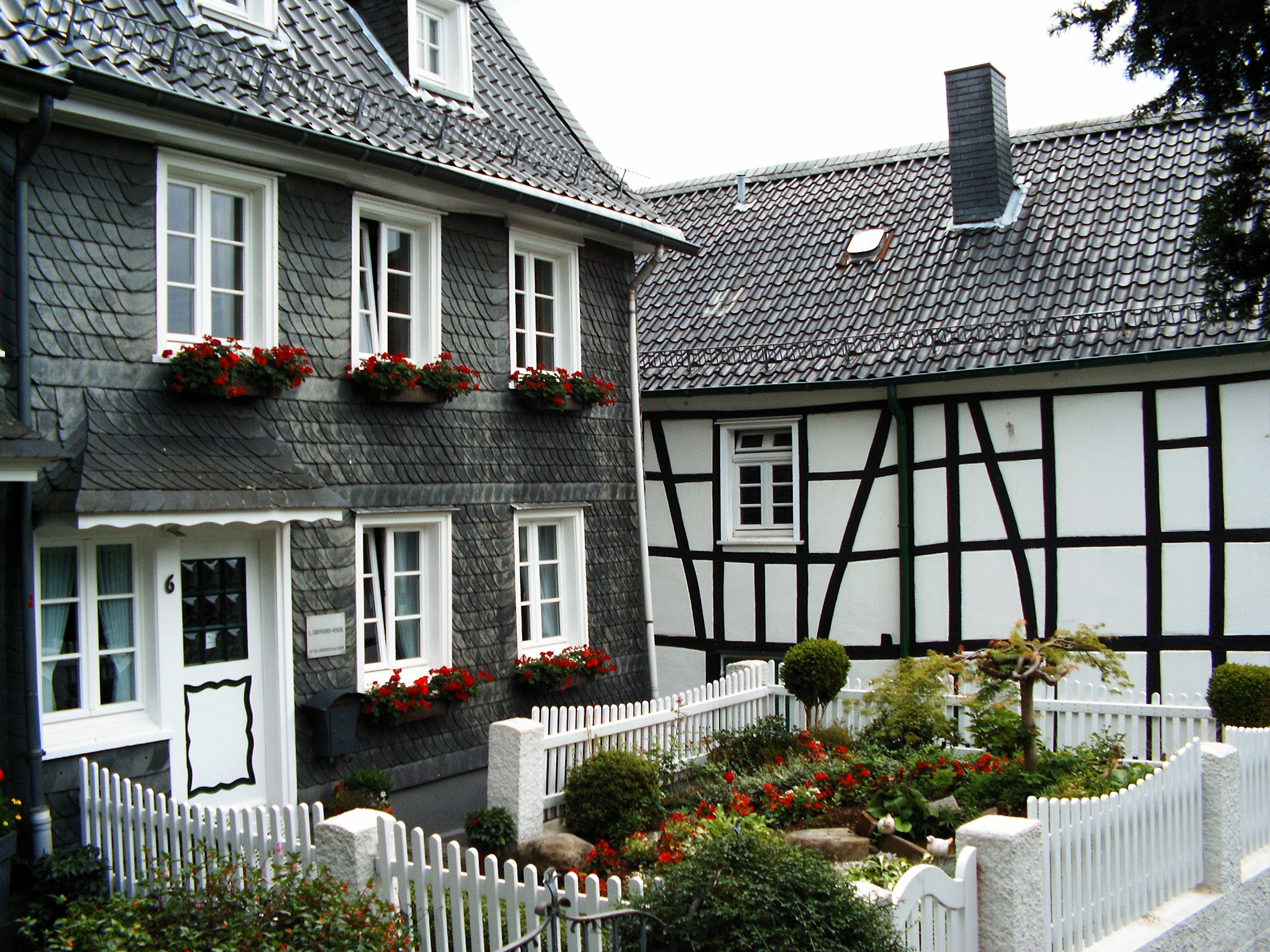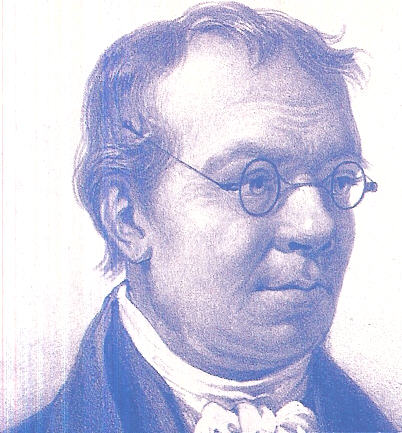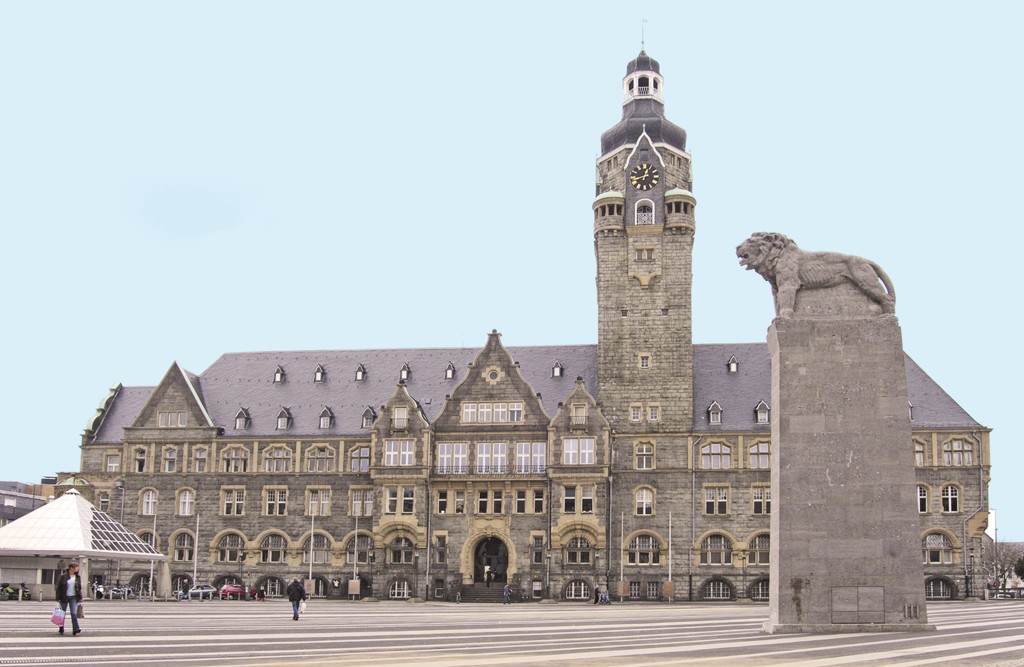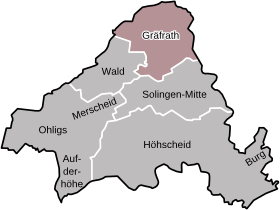|
Solingen, Germany
Solingen (; li, Solich) is a city in North Rhine-Westphalia, Germany. It is located some 25 km east of Düsseldorf along the northern edge of the region called Bergisches Land, south of the Ruhr area, and, with a 2009 population of 161,366, is after Wuppertal the second-largest city in the Bergisches Land. It is a member of the regional authority of the Rhineland. Solingen is called the "City of Blades", since it has long been renowned for the manufacturing of fine swords, knives, scissors and razors made by famous firms such as WKC, DOVO, Wüsthof, Zwilling J. A. Henckels, Böker, Güde, Hubertus, Diefenthal, Puma, Clauberg, Eickhorn, Linder, Carl Schmidt Sohn, Dreiturm, Herder, and numerous other manufacturers. In medieval times, the swordsmiths of Solingen designed the town's coat of arms, which continues to the present. In the latter part of the 17th century, a group of swordsmiths from Solingen broke their guild oaths by taking their sword-making secrets with them ... [...More Info...] [...Related Items...] OR: [Wikipedia] [Google] [Baidu] |
Söllingen
Söllingen is a Municipalities of Germany, municipality in the Helmstedt (district), district of Helmstedt, in Lower Saxony, Germany. The Municipality Söllingen includes the villages of Dobbeln, Söllingen and Wobeck. And since 1 November 2016, the former municipalities Ingeleben and Twieflingen are part of the municipality Söllingen. References Helmstedt (district) {{Helmstedt-geo-stub ... [...More Info...] [...Related Items...] OR: [Wikipedia] [Google] [Baidu] |
Hilden
Hilden is a town in the German state of North Rhine-Westphalia. It is situated in the District of Mettmann, west of Solingen and east of Düsseldorf on the right side of the Rhine. It is a middle sized industrial town with a forest and numerous attractions. The Mayor is Claus Pommer, who took office in 2020. Geography With approx. 57,000 inhabitants, Hilden is the fourth largest city in the District of Mettmann. In contrast to the surrounding cities, it has no suburban districts or incorporated villages. Hilden has a compact urbanized city centre and borders some smaller woods. History Hilden was named in written sources already in the 11th century. In the 13th century in the centre of the early settlement a Romanesque church was erected, which during the Reformation became Protestant. Later a second church for Catholics had been built. In the time of industrialization many factories especially in textiles, engineering and painting had been founded. In both World Wars the p ... [...More Info...] [...Related Items...] OR: [Wikipedia] [Google] [Baidu] |
Mettmann (district)
Mettmann () is a Kreis (district) in the middle of North Rhine-Westphalia, Germany. Neighboring are the Ennepe-Ruhr, Rhein-Kreis Neuss, Rheinisch-Bergischer Kreis and the district-free cities Cologne, Leverkusen, Wuppertal, Solingen, Düsseldorf, Duisburg, Mülheim, Essen. It is the most densely populated rural district in Germany; it borders Düsseldorf Airport in the northwestern district borders, on the city limits of Ratingen, and is also near Cologne Bonn Airport. It was named after Mettmann, its district seat. History In the 12th century the area of today's district became the property of the earldom Berg. When Napoleon occupied the area in 1792 it became a canton in the arrondissement Düsseldorf. After the Congress of Vienna the area went to Prussia in 1816 as part of the province Westphalia, and the first district Mettmann was created. This district was merged from 1820 till 1861 with the district Elberfeld, which then became a city in its own right, now it is part of Wup ... [...More Info...] [...Related Items...] OR: [Wikipedia] [Google] [Baidu] |
Langenfeld, Rhineland
Langenfeld ( Ripuarian: ''Langefääl'') is a town in North Rhine-Westphalia (Germany) in the district of Mettmann. The suburban city is located between Düsseldorf and Cologne. Langenfeld was formed from the two localities of Richrath and Reusrath and received city rights in 1948. Economics Langenfeld has no public debt as of October 3, 2008. The debt clock installed at the town hall in 1997, showing the current debts of Langenfeld, the Rhineland, and the national debt, got demounted end of 2008 and handed over to Grevenbroich. In Langenfeld it had served its purpose, so the comment by former mayor Magnus Staehler. The town was honored for that with the prize ''Kommune des Jahres 2007'' (''Municipality of the Year 2007'') in the national contest ''Großer Preis des Mittelstandes'' (''Grand Prize by Small Firms and Traders'') of the Oskar-Patzelt-Siftung. To achieve that goal, on the one hand taxes got raised and in addition cuts of subsidies to clubs applied, so that debts h ... [...More Info...] [...Related Items...] OR: [Wikipedia] [Google] [Baidu] |
Leichlingen
Leichlingen (officially Leichlingen (Rheinland); Ripuarian: ''Lëijchlinge'') is a town in the Rheinisch-Bergischer Kreis, North Rhine-Westphalia, Germany. Leichlingen is a centre for apple and berry growing in the region. Geography Leichlingen is situated at the edge of the Rhine-Ruhr metropolitan region close to Cologne. The town centre lies on the river Wupper. Twin towns – sister cities Leichlingen is twinned with: * Funchal, Portugal * Henley-on-Thames, England, United Kingdom * Marly-le-Roi, France Notable people * Johann Wilhelm Wilms (1772–1847), composer * Friedrich Überweg (1826–1871), philosopher *Hugo Broch Hugo Broch (born 6 January 1922) is a German Luftwaffe ace during the Second World War who is credited with 81 victories in 324 missions, all on the Eastern Front. He is a recipient of the Knight's Cross of the Iron Cross. World War II Broch ... (born 1922), World War II flying ace * Wolfgang Zimmermann (born 1949), trade unionist, politician (Th ... [...More Info...] [...Related Items...] OR: [Wikipedia] [Google] [Baidu] |
Rheinisch-Bergischer Kreis
The Rheinisch-Bergische Kreis is a Kreis (district) in the Cologne Bonn Region of North Rhine-Westphalia, Germany. Neighboring districts are Kreis Mettman, Oberbergischer Kreis and Rhein-Sieg, and the district-free cities Cologne, Leverkusen, Solingen and Remscheid. History The area of the ''Bergisches Land'' belonged to the earldom Berg for most of medieval times, and still gives the district its name. In 1816 after the whole Rhineland area did come to Prussia the districts of Wipperfürth, Mülheim, Lennep, Opladen and Solingen were created on the area now covered by the district. In 1819 Opladen and Solingen were merged into a bigger Solingen district. In 1929 a new Rhein-Wupper district was created, while several municipalities were incorporated into the cities Wuppertal, Remscheid and Solingen. 1932 the districts Mülheim and Wipperfürth were merged to form the old ''Rheinisch-Bergische Kreis''. Finally, in 1975 most area of the two districts Rhein-Wupper and Rheinisch-Be ... [...More Info...] [...Related Items...] OR: [Wikipedia] [Google] [Baidu] |
Wermelskirchen
Wermelskirchen (; Ripuarian: ''Wärmelßkirrshe'') is a town in the Rheinisch-Bergischer Kreis, in North Rhine-Westphalia, Germany, southeast of Remscheid. It is home to one of Europe's biggest live Christmas trees (measuring 26m). Coat of arms The coat-of-arms of the city of Wermelskirchen looks like a silver shield split into thirds. In the left field is an oak tree. In the right field there is a Swan and pictured in the middle field there is a church. Education Wermelskirchen has an Evangelical, a Roman Catholic church and a Latin school. Economy The city has the head office of OBI and the origin of the caster manufacturer TENTE. Twin towns – sister cities Wermelskirchen is twinned with: * Forst, Germany * Loches, France Notable people *Carl Leverkus (1804–1889), founder of a German chemical and pharmaceutical company and the namesake of the city of Leverkusen *Uwe Boll (born 1965), film director and writer, restaurateur and founder of Bauhaus Restaurant chains in ... [...More Info...] [...Related Items...] OR: [Wikipedia] [Google] [Baidu] |
Remscheid
Remscheid () is a List of cities and towns in Germany, city in North Rhine-Westphalia, Germany. It is, after Wuppertal and Solingen, the third-largest municipality in Bergisches Land, being located on the northern edge of the region, on the south side of the Ruhr area. Remscheid had around 109,000 inhabitants in 2015. At the end of 2019 it had 113,703 inhabitants. Geography Remscheid comprises four boroughs, ''Alt-Remscheid'', ''Remscheid-Süd'', ''Lennep'', and Lüttringhausen. Its highest point is the Brodtberg (378 m). History Remscheid was founded in the 12th century, but remained a small village until the 19th century. Early spellings for the city included ''Remissgeid'' (1217), ''Rymscheyd'' (1351), ''Reymscheyd'' (1487) and ''Rembscheid'' (1639). The economic growth of the entire Rhine-Ruhr region led to an increase of the population of Remscheid. Mechanical engineering and toolmaking were the main industries practised within the town. This is carried on today with the H ... [...More Info...] [...Related Items...] OR: [Wikipedia] [Google] [Baidu] |
Urban Districts Of Germany ...
The sixteen constituent states of Germany are divided into a total of 401 administrative ''Kreis'' or ''Landkreis''; these consist of 294 rural districts (german: Landkreise or – the latter in the states of North Rhine-Westphalia and Schleswig-Holstein only), and 107 urban districts ( or, in Baden-Württemberg only, – cities that constitute districts in their own right). List Historical *Administrative divisions of East Germany *Administrative divisions of Nazi Germany See also *Districts of Germany * States of Germany * List of rural districts with populations and area * List of urban districts with populations and area References {{Reflist, 30em * Districts Districts A district is a type of administrative division that, in some countries, is managed by the local government. Across the world, areas known as "districts" vary greatly in size, spanning regions or counties, several municipalities, subdivisions o ... [...More Info...] [...Related Items...] OR: [Wikipedia] [Google] [Baidu] |
Water Tower
A water tower is an elevated structure supporting a water tank constructed at a height sufficient to pressurize a water distribution system, distribution system for potable water, and to provide emergency storage for fire protection. Water towers often operate in conjunction with underground or surface service reservoirs, which store treated water close to where it will be used. Other types of water towers may only store raw (non-potable) water for fire protection or industrial purposes, and may not necessarily be connected to a public water supply. Water towers are able to supply water even during power outages, because they rely on hydrostatic pressure produced by elevation of water (due to gravity) to push the water into domestic and industrial water distribution systems; however, they cannot supply the water for a long time without power, because a pump is typically required to refill the tower. A water tower also serves as a reservoir to help with water needs during peak us ... [...More Info...] [...Related Items...] OR: [Wikipedia] [Google] [Baidu] |
Gräfrath
Gräfrath or Graefrath is a district of Solingen in the German federal state of North Rhine-Westphalia, about east of Düsseldorf. History There was an abbey An abbey is a type of monastery used by members of a religious order under the governance of an abbot or abbess. Abbeys provide a complex of buildings and land for religious activities, work, and housing of Christian monks and nuns. The conce ... in Gräfrath from 1185 to 1803. In the past, iron, steel, and weaving were important economic activities. References External links Solingen {{Solingen-geo-stub ... [...More Info...] [...Related Items...] OR: [Wikipedia] [Google] [Baidu] |








